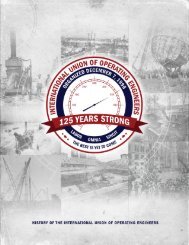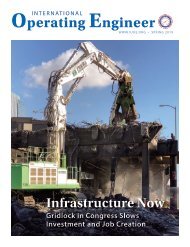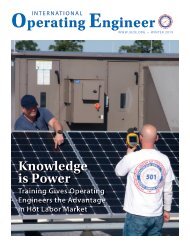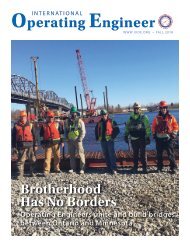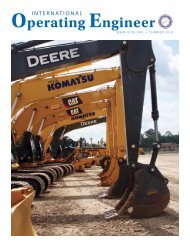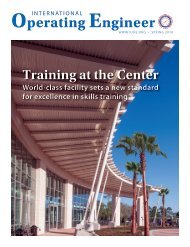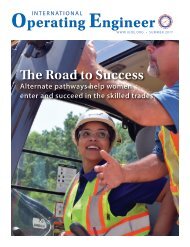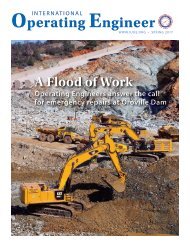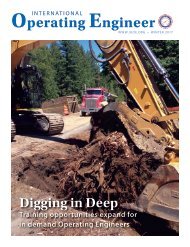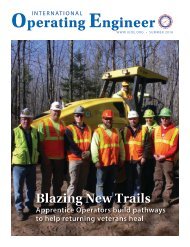International Operating Engineer - Winter 2018
The quarterly magazine of the International Union of Operating Engineers.
The quarterly magazine of the International Union of Operating Engineers.
Create successful ePaper yourself
Turn your PDF publications into a flip-book with our unique Google optimized e-Paper software.
Politics & Legislation<br />
Missouri Voters Will Decide Fate of “Right to Work” Law<br />
New Tax Law Brings Changes to Rates and Deductions<br />
FOR MORE THAN five years, antiunion<br />
politicians and corporate special<br />
interests have been spending millions<br />
of dollars in Missouri to pass so-called<br />
“right to work” legislation. In 2015 there<br />
was a close call when the Republicanled<br />
Missouri House of Representatives<br />
passed so-called “right to work” by<br />
a 92-66 vote and the state Senate<br />
vote was 21-13. Then-Governor Jay<br />
Nixon vetoed the legislation, stating,<br />
“Right-to-work is wrong for Missouri,<br />
it’s wrong for the middle-class - and<br />
it must never become the law of the<br />
Show-Me State.”<br />
Despite an aggressive campaign<br />
by <strong>Operating</strong> <strong>Engineer</strong>s and others<br />
in the labor movement to support<br />
Attorney General Chris Koster in his<br />
bid for Governor, the November 2016<br />
election saw anti-union gubernatorial<br />
candidate Eric Greitens surge in the<br />
last days of the election to swipe victory<br />
away from Koster.<br />
Greitens did not waste any time<br />
on following through on his antiunion<br />
platform. On February 6, 2017,<br />
Greitens signed so-called “right to<br />
work” legislation into law. The Show-<br />
Me State was on its way to enabling free<br />
riders to take advantage of other union<br />
members by demanding services from<br />
the union, but not paying a dime for<br />
them. The law was set to become<br />
effective on August 28, 2017.<br />
However, Missouri labor unions<br />
did not give up the fight. IUOE Local<br />
Unions 101, 148 and 513, along with<br />
other unions, created the We Are<br />
Missouri coalition. Through that<br />
organization, they worked diligently<br />
collecting signatures to place the<br />
legislation on the ballot for a “citizens<br />
veto,” allowing voters to decide the<br />
issue.<br />
The Missouri Secretary of State<br />
requires 108,467 signatures to certify<br />
a voter referendum. Ten days before<br />
the law’s effective date, the coalition<br />
delivered a record number of signatures<br />
to the Secretary of State, placing a<br />
referendum on the ballot in <strong>2018</strong> and<br />
“staying” the right to work law. We Are<br />
Missouri collected 300,000 signatures!<br />
On November 22, 2017, the Secretary of<br />
State certified that the referendum had<br />
sufficient support.<br />
We are Missouri is continuing the<br />
campaign to educate the public on<br />
the impact to the middle class if this<br />
proposal becomes law.<br />
At press time, the vote is scheduled<br />
for the general election ballot this<br />
November. But the Legislature and the<br />
Governor believe that they would have<br />
an advantage by placing the anti-union<br />
measure on the August primary ballot.<br />
They expect a lower turnout in August,<br />
and they expect a strategic advantage<br />
with fewer voters. It is just one more<br />
attempt to silence the voices of working<br />
people.<br />
The Legislature must pass a law to<br />
change the election date to August,<br />
so the Missouri labor movement is<br />
preparing for either election date. No<br />
matter when the election occurs, the<br />
IUOE will be working hard to mobilize<br />
the middle class against these antiunion,<br />
anti-worker policies.<br />
To learn more about the campaign,<br />
please visit the We Are Missouri web<br />
site at http://www.wearemissouri.org<br />
ENGINEERS<br />
ACTION &<br />
RESPONSE<br />
NETWORK<br />
REGISTER TODAY!<br />
WWW.IUOE.ORG<br />
ON A STRICTLY party line vote,<br />
Congress passed H.R. 1, the Tax Cuts<br />
and Jobs Act, which made significant<br />
changes to the nation’s tax law.<br />
President Trump signed the bill at the<br />
end of 2017. The changes will go into<br />
effect for tax year <strong>2018</strong>; these changes<br />
won’t affect your filing for 2017.<br />
INDIVIDUAL TAXES<br />
In a nutshell, the bill modestly lowers<br />
individual tax rates for most American<br />
households. The bill also increases the<br />
standard deduction available to most<br />
tax filers. (See a tax professional about<br />
how the changes may affect you and<br />
your family.) But the legislation also<br />
eliminated key deductions for working<br />
people and middle-class Americans.<br />
In particular, the bill eliminated the<br />
following deductions:<br />
• Purchase of travel, transportation,<br />
meals, and local lodging related to<br />
work;<br />
• Union dues and expenses;<br />
• Work clothes and uniforms if<br />
required and not suitable for<br />
everyday use;<br />
• Work-related education; and<br />
• Limited the state and local tax<br />
exemption to $10,000;<br />
• The mortgage interest deduction<br />
will be capped for homes up to<br />
$750,000<br />
Those will be big hits for many<br />
middle-class taxpayers, including<br />
thousands of <strong>Operating</strong> <strong>Engineer</strong>s.<br />
For many taxpayers, the increase in<br />
the standard deduction will more than<br />
make up for the loss of those workrelated<br />
and other deductions. Again,<br />
consult a tax professional about your<br />
personal situation.<br />
CORPORATE TAXES<br />
The bigger changes to tax law took<br />
place on the business and corporate<br />
tax side. The corporate rate goes from<br />
35% to 21%. The bill allows businesses<br />
to immediately write off the full cost<br />
of new equipment. The bill reduces<br />
rates on “pass through” companies –<br />
a major boon to professional service<br />
companies and real-estate developers<br />
like the Trump Organization. The bill<br />
lowers the rate on foreign-sourced<br />
income and is expected to “repatriate”<br />
those profits back to the U.S. The<br />
legislation lowers the repatriated tax<br />
rate to 15.5%. That’s down from the<br />
traditional corporate tax rate of 35%.<br />
Past legislation has proposed to use<br />
these international tax changes to<br />
finance public-works investments. But<br />
this tax law swallows up the revenue<br />
and fails to assist financing investments<br />
to rebuild American roads, bridges,<br />
and infrastructure.<br />
INFRASTRUCTURE<br />
The tax legislation basically<br />
eliminated the ability of state and local<br />
governments to refinance municipal<br />
bonds. Eliminating that tool will save<br />
taxpayers about $18 billion over ten<br />
years. But eliminating it also raises the<br />
cost of financing roads, bridges, schools<br />
and other infrastructure. About onethird<br />
of all municipal bond issuances<br />
in 2016 used these refinancing tools.<br />
The legislation also eliminates three<br />
small tax credit bond programs that<br />
help finance school, energy, and other<br />
infrastructure projects. Other changes<br />
were proposed throughout the process,<br />
but public-works advocates fought off<br />
bigger attacks on infrastructure.<br />
10<br />
INTERNATIONAL OPERATING ENGINEER<br />
WINTER <strong>2018</strong> 11



